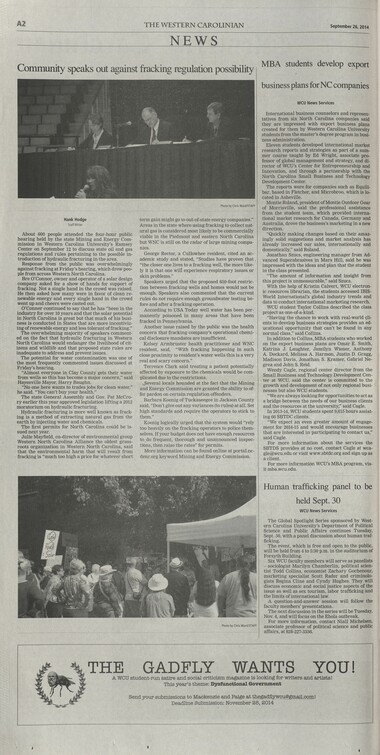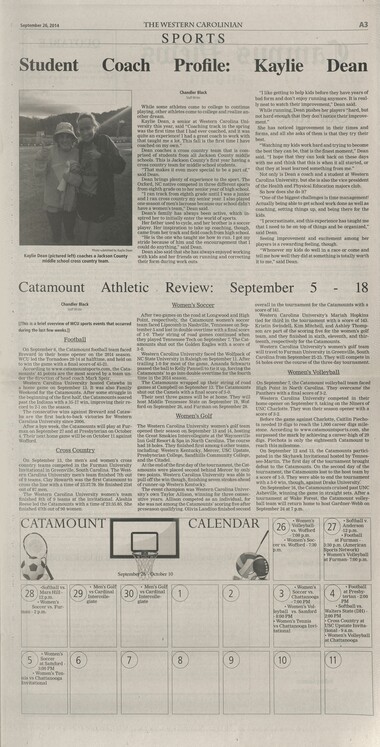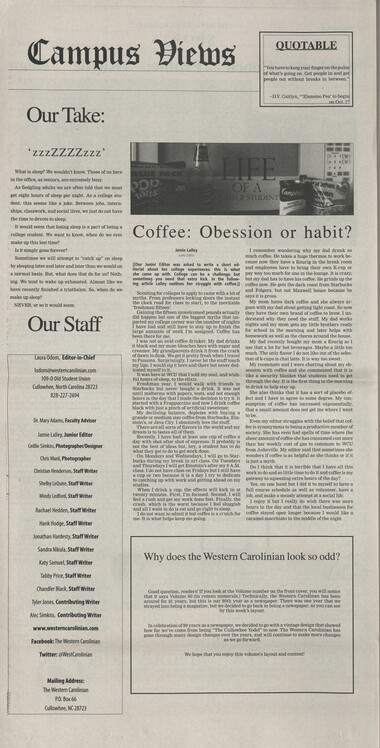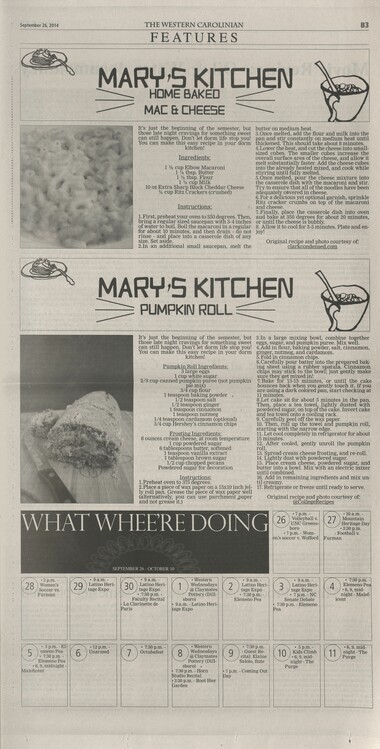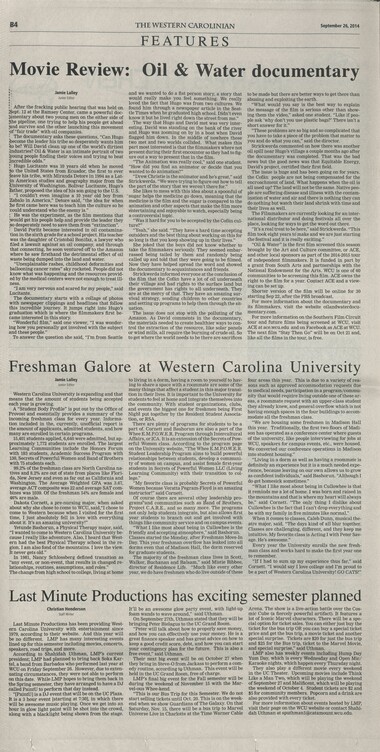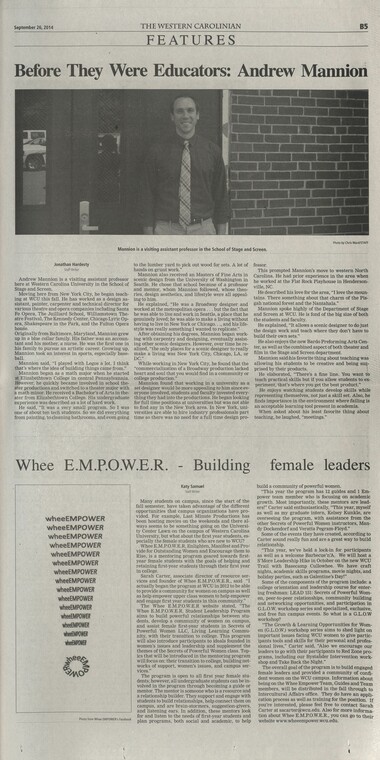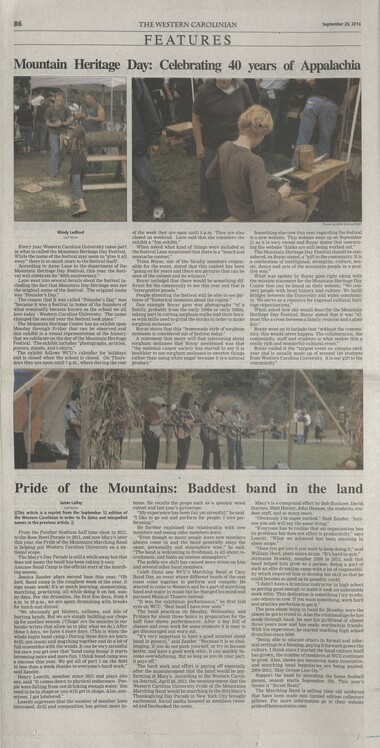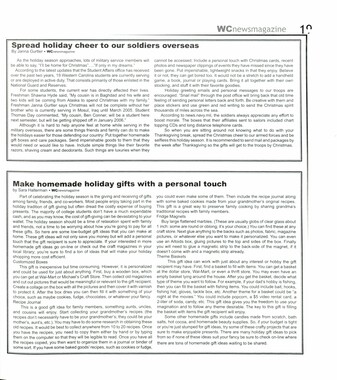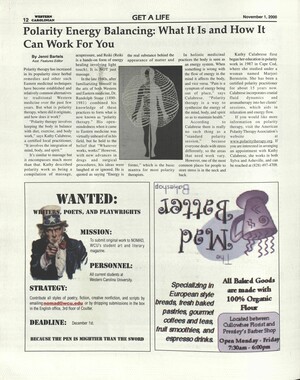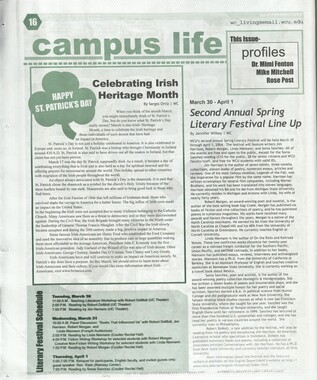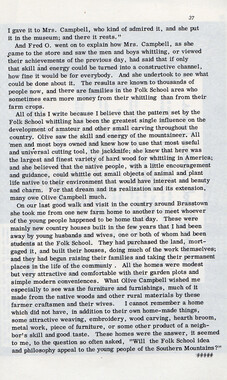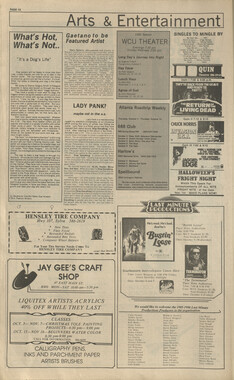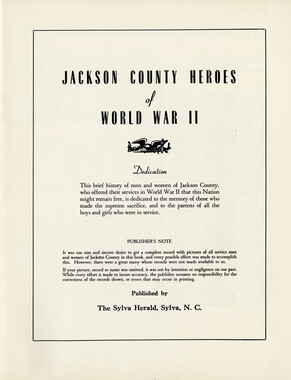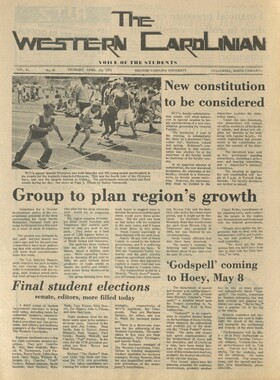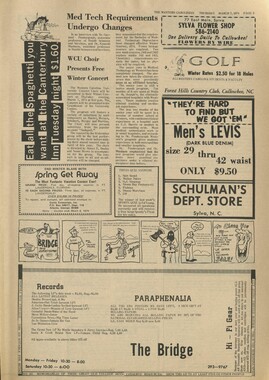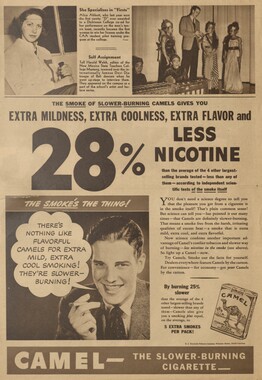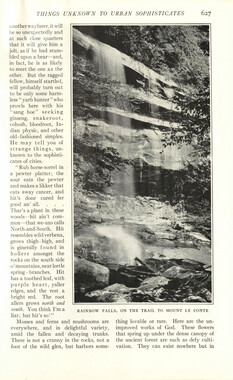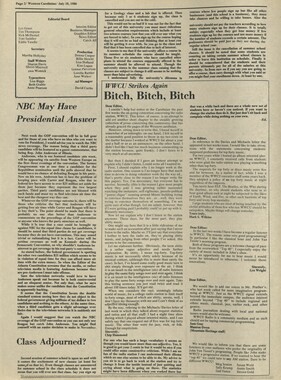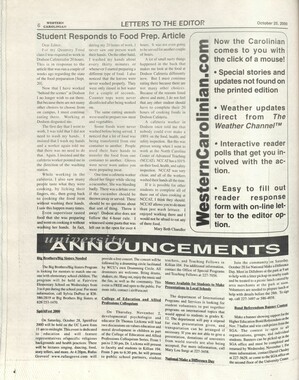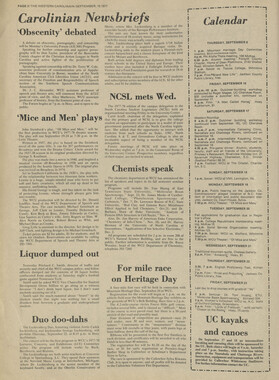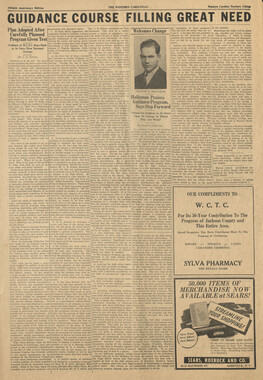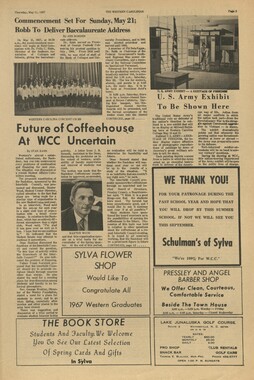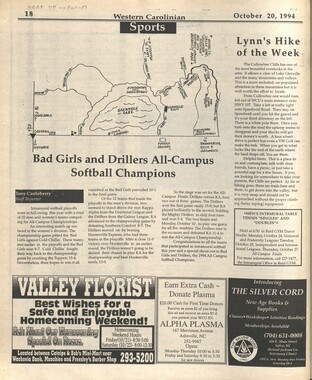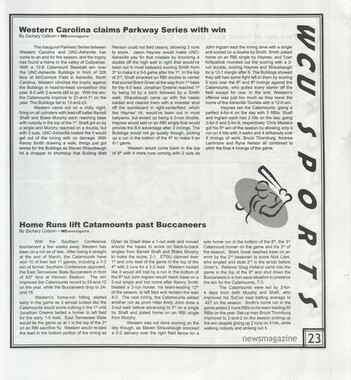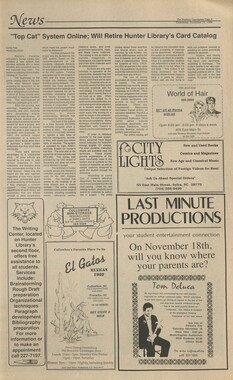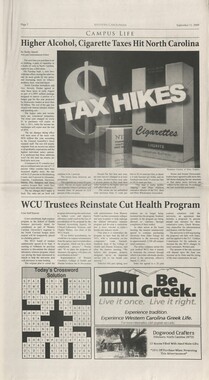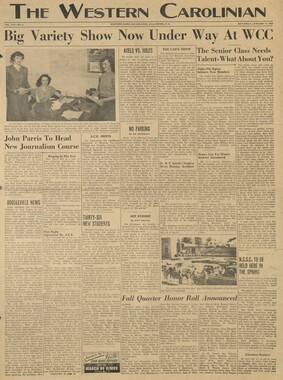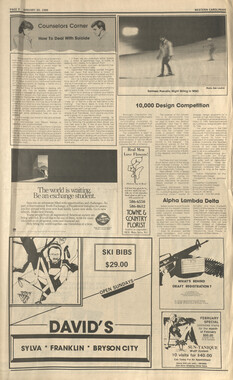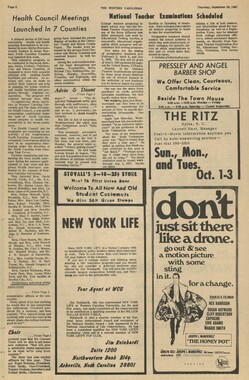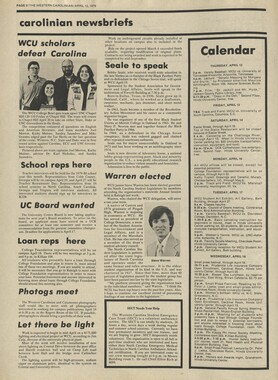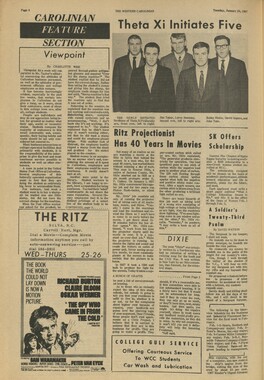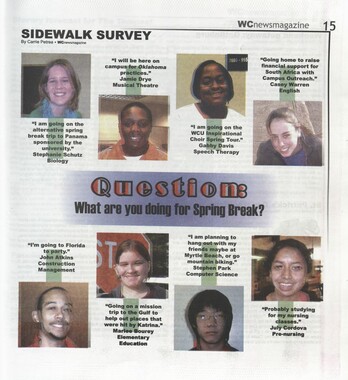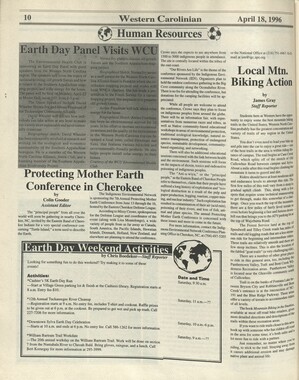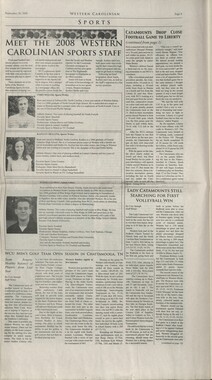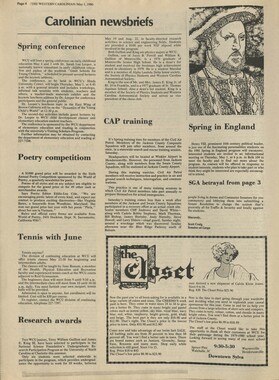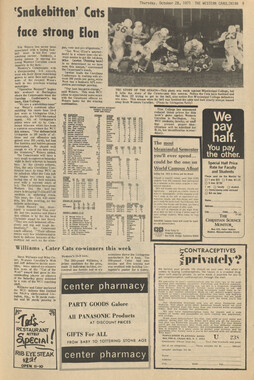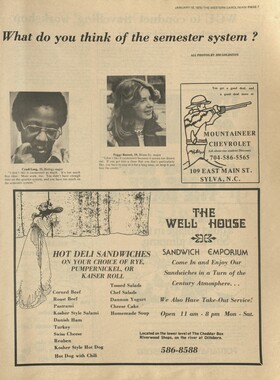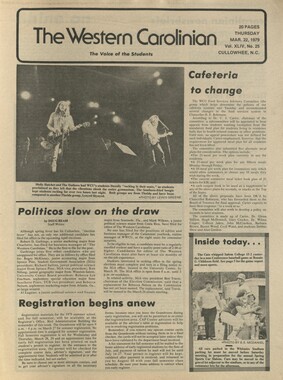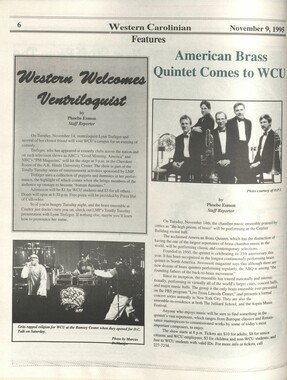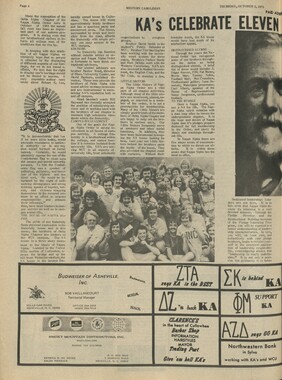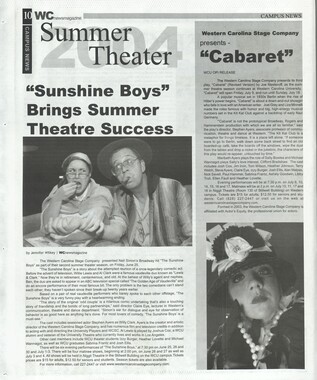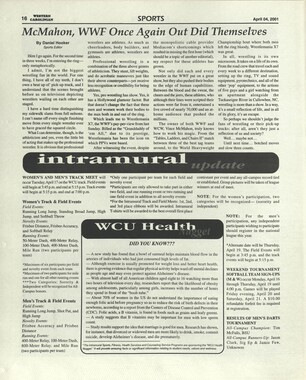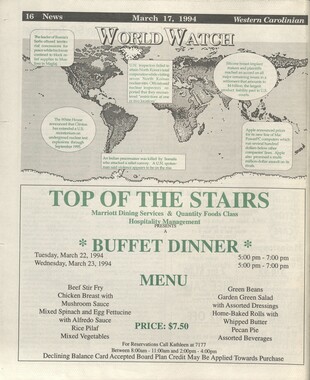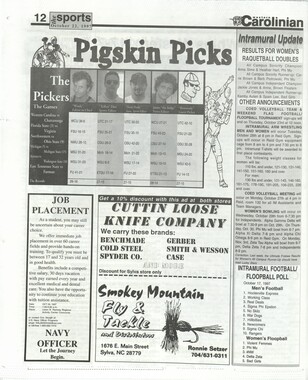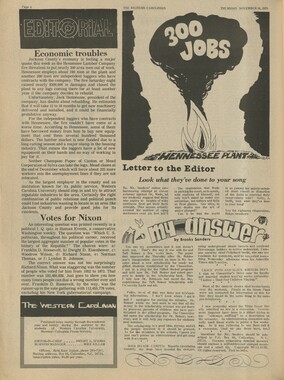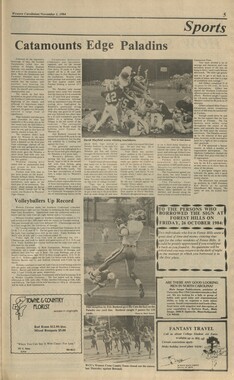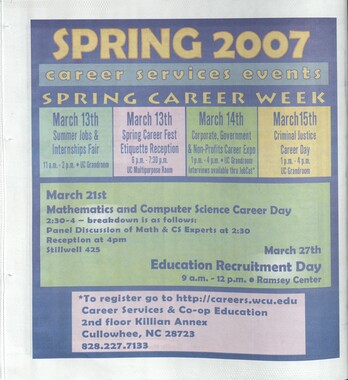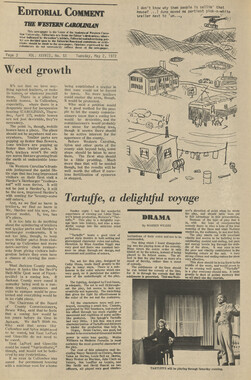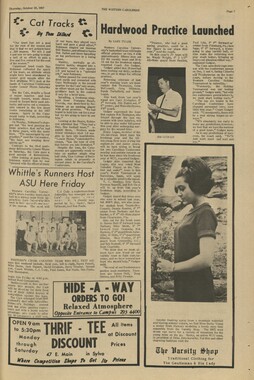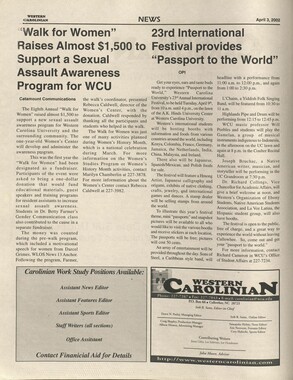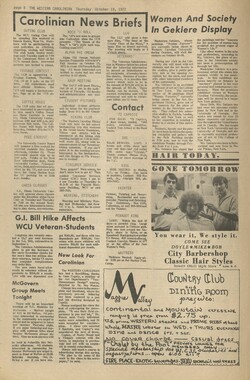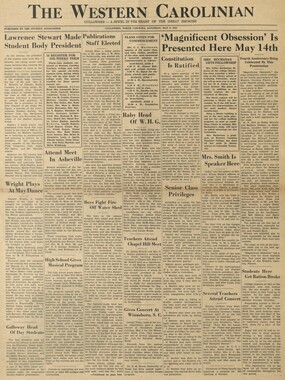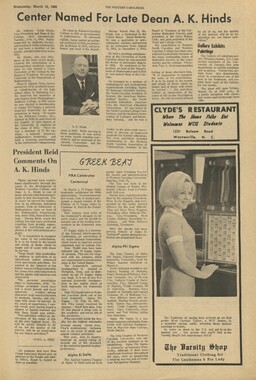Western Carolina University (21)
View all
- Canton Champion Fibre Company (2308)
- Cherokee Traditions (291)
- Civil War in Southern Appalachia (165)
- Craft Revival (1942)
- George Masa Collection (137)
- Great Smoky Mountains - A Park for America (3080)
- Highlights from Western Carolina University (422)
- Horace Kephart (973)
- Journeys Through Jackson (159)
- LGBTQIA+ Archive of Jackson County (89)
- Oral Histories of Western North Carolina (318)
- Picturing Appalachia (6617)
- Stories of Mountain Folk (413)
- Travel Western North Carolina (153)
- Western Carolina University Fine Art Museum Vitreograph Collection (129)
- Western Carolina University Herbarium (92)
- Western Carolina University: Making Memories (738)
- Western Carolina University Publications (2491)
- Western Carolina University Restricted Electronic Theses and Dissertations (146)
- Western North Carolina Regional Maps (71)
- World War II in Southern Appalachia (131)
University of North Carolina Asheville (6)
View all
- Allanstand Cottage Industries (62)
- Appalachian National Park Association (53)
- Bennett, Kelly, 1890-1974 (1463)
- Berry, Walter (76)
- Brasstown Carvers (40)
- Carver, George Washington, 1864?-1943 (26)
- Cathey, Joseph, 1803-1874 (1)
- Champion Fibre Company (233)
- Champion Paper and Fibre Company (297)
- Cherokee Indian Fair Association (16)
- Cherokee Language Program (22)
- Crowe, Amanda (40)
- Edmonston, Thomas Benton, 1842-1907 (7)
- Ensley, A. L. (Abraham Lincoln), 1865-1948 (275)
- Fromer, Irving Rhodes, 1913-1994 (70)
- George Butz (BFS 1907) (46)
- Goodrich, Frances Louisa (120)
- Grant, George Alexander, 1891-1964 (96)
- Heard, Marian Gladys (60)
- Kephart, Calvin, 1883-1969 (15)
- Kephart, Horace, 1862-1931 (313)
- Kephart, Laura, 1862-1954 (67)
- Laney, Gideon Thomas, 1889-1976 (439)
- Masa, George, 1881-1933 (61)
- McElhinney, William Julian, 1896-1953 (44)
- Niggli, Josephina, 1910-1983 (10)
- North Carolina Park Commission (105)
- Osborne, Kezia Stradley (9)
- Owens, Samuel Robert, 1918-1995 (11)
- Penland Weavers and Potters (36)
- Roberts, Vivienne (15)
- Roth, Albert, 1890-1974 (142)
- Schenck, Carl Alwin, 1868-1955 (1)
- Sherrill's Photography Studio (2565)
- Southern Highland Handicraft Guild (127)
- Southern Highlanders, Inc. (71)
- Stalcup, Jesse Bryson (46)
- Stearns, I. K. (213)
- Thompson, James Edward, 1880-1976 (226)
- United States. Indian Arts and Crafts Board (130)
- USFS (683)
- Vance, Zebulon Baird, 1830-1894 (1)
- Weaver, Zebulon, 1872-1948 (58)
- Western Carolina College (230)
- Western Carolina Teachers College (282)
- Western Carolina University (2008)
- Western Carolina University. Mountain Heritage Center (18)
- Whitman, Walt, 1819-1892 (10)
- Wilburn, Hiram Coleman, 1880-1967 (73)
- Williams, Isadora (3)
- Cain, Doreyl Ammons (0)
- Crittenden, Lorraine (0)
- Rhodes, Judy (0)
- Smith, Edward Clark (0)
- Appalachian Region, Southern (3032)
- Asheville (N.C.) (1945)
- Avery County (N.C.) (26)
- Blount County (Tenn.) (195)
- Buncombe County (N.C.) (1680)
- Cherokee County (N.C.) (283)
- Clay County (N.C.) (556)
- Graham County (N.C.) (238)
- Great Smoky Mountains National Park (N.C. and Tenn.) (525)
- Haywood County (N.C.) (3573)
- Henderson County (N.C.) (70)
- Jackson County (N.C.) (4925)
- Knox County (Tenn.) (35)
- Knoxville (Tenn.) (13)
- Lake Santeetlah (N.C.) (10)
- Macon County (N.C.) (421)
- Madison County (N.C.) (216)
- McDowell County (N.C.) (39)
- Mitchell County (N.C.) (135)
- Polk County (N.C.) (35)
- Qualla Boundary (982)
- Rutherford County (N.C.) (78)
- Swain County (N.C.) (2185)
- Transylvania County (N.C.) (270)
- Watauga County (N.C.) (12)
- Waynesville (N.C.) (86)
- Yancey County (N.C.) (72)
- Aerial Photographs (3)
- Aerial Views (60)
- Albums (books) (4)
- Articles (1)
- Artifacts (object Genre) (228)
- Bibliographies (1)
- Biography (general Genre) (2)
- Cards (information Artifacts) (38)
- Clippings (information Artifacts) (192)
- Copybooks (instructional Materials) (3)
- Crafts (art Genres) (622)
- Depictions (visual Works) (21)
- Design Drawings (1)
- Digital Moving Image Formats (2)
- Drawings (visual Works) (185)
- Envelopes (101)
- Exhibitions (events) (1)
- Facsimiles (reproductions) (1)
- Fiction (general Genre) (4)
- Financial Records (12)
- Fliers (printed Matter) (67)
- Glass Plate Negatives (381)
- Guidebooks (2)
- Internegatives (10)
- Interviews (823)
- Land Surveys (102)
- Letters (correspondence) (1045)
- Manuscripts (documents) (618)
- Maps (documents) (177)
- Memorandums (25)
- Minutes (administrative Records) (59)
- Negatives (photographs) (6090)
- Newsletters (1290)
- Newspapers (2)
- Notebooks (8)
- Occupation Currency (1)
- Paintings (visual Works) (1)
- Pen And Ink Drawings (1)
- Periodicals (194)
- Personal Narratives (10)
- Photographs (12977)
- Plans (maps) (1)
- Poetry (6)
- Portraits (4568)
- Postcards (329)
- Programs (documents) (181)
- Publications (documents) (2444)
- Questionnaires (65)
- Relief Prints (26)
- Sayings (literary Genre) (1)
- Scrapbooks (282)
- Sheet Music (2)
- Slides (photographs) (402)
- Songs (musical Compositions) (2)
- Sound Recordings (802)
- Specimens (92)
- Speeches (documents) (18)
- Tintypes (photographs) (8)
- Transcripts (329)
- Text Messages (0)
- A.L. Ensley Collection (275)
- Appalachian Industrial School Records (7)
- Appalachian National Park Association Records (336)
- Axley-Meroney Collection (2)
- Bayard Wootten Photograph Collection (20)
- Bethel Rural Community Organization Collection (7)
- Blumer Collection (5)
- C.W. Slagle Collection (20)
- Canton Area Historical Museum (2110)
- Carlos C. Campbell Collection (462)
- Cataloochee History Project (64)
- Cherokee Studies Collection (4)
- Daisy Dame Photograph Album (5)
- Daniel Boone VI Collection (1)
- Doris Ulmann Photograph Collection (112)
- Elizabeth H. Lasley Collection (1)
- Elizabeth Woolworth Szold Fleharty Collection (4)
- Frank Fry Collection (95)
- George Masa Collection (173)
- Gideon Laney Collection (452)
- Hazel Scarborough Collection (2)
- Hiram C. Wilburn Papers (28)
- Historic Photographs Collection (236)
- Horace Kephart Collection (861)
- Humbard Collection (33)
- Hunter and Weaver Families Collection (1)
- I. D. Blumenthal Collection (4)
- Isadora Williams Collection (4)
- Jesse Bryson Stalcup Collection (47)
- Jim Thompson Collection (224)
- John B. Battle Collection (7)
- John C. Campbell Folk School Records (80)
- John Parris Collection (6)
- Judaculla Rock project (2)
- Kelly Bennett Collection (1482)
- Love Family Papers (11)
- Major Wiley Parris Civil War Letters (3)
- Map Collection (12)
- McFee-Misemer Civil War Letters (34)
- Mountain Heritage Center Collection (4)
- Norburn - Robertson - Thomson Families Collection (44)
- Pauline Hood Collection (7)
- Pre-Guild Collection (2)
- Qualla Arts and Crafts Mutual Collection (12)
- R.A. Romanes Collection (681)
- Rosser H. Taylor Collection (1)
- Samuel Robert Owens Collection (94)
- Sara Madison Collection (144)
- Sherrill Studio Photo Collection (2558)
- Smoky Mountains Hiking Club Collection (616)
- Stories of Mountain Folk - Radio Programs (374)
- The Reporter, Western Carolina University (510)
- Venoy and Elizabeth Reed Collection (16)
- WCU Gender and Sexuality Oral History Project (36)
- WCU Mountain Heritage Center Oral Histories (25)
- WCU Oral History Collection - Mountain People, Mountain Lives (71)
- WCU Students Newspapers Collection (1923)
- Western North Carolina Tomorrow Black Oral History Project (69)
- William Williams Stringfield Collection (2)
- Zebulon Weaver Collection (109)
- African Americans (390)
- Appalachian Trail (35)
- Artisans (521)
- Cherokee art (84)
- Cherokee artists -- North Carolina (10)
- Cherokee language (21)
- Cherokee pottery (101)
- Cherokee women (208)
- Church buildings (190)
- Civilian Conservation Corps (U.S.) (111)
- College student newspapers and periodicals (2012)
- Dams (108)
- Dance (1023)
- Education (222)
- Floods (63)
- Folk music (1015)
- Forced removal, 1813-1903 (2)
- Forest conservation (220)
- Forests and forestry (1198)
- Gender nonconformity (4)
- Great Smoky Mountains National Park (N.C. and Tenn.) (181)
- Hunting (47)
- Landscape photography (25)
- Logging (122)
- Maps (83)
- Mines and mineral resources (9)
- North Carolina -- Maps (18)
- Paper industry (38)
- Postcards (255)
- Pottery (135)
- Railroad trains (72)
- Rural electrification -- North Carolina, Western (3)
- School integration -- Southern States (2)
- Segregation -- North Carolina, Western (5)
- Slavery (5)
- Sports (452)
- Storytelling (243)
- Waterfalls -- Great Smoky Mountains (N.C. and Tenn.) (66)
- Weaving -- Appalachian Region, Southern (280)
- Wood-carving -- Appalachian Region, Southern (328)
- World War, 1939-1945 (173)
Western Carolinian Volume 80 Number 03
Item
Item’s are ‘child’ level descriptions to ‘parent’ objects, (e.g. one page of a whole book).
-
-
A2 THE WESTERN CAROLINIAN September 26, 2014 NEWS Community speaks out against fracking regulation possibility Hank Hodge Staff Writer About 600 people attended the four-hour public hearing held by the state Mining and Energy Com- mission in Western Carolina Universitys Ramsey Center on September 12 to discuss state oil and gas regulations and rules pertaining to the possible in- troduction of hydraulic fracturing in the area. | Response from the public was overwhelmingly against fracking at Fridays hearing, which drew peo- ple from across Western North Carolina. Bre OConnor, owner and operator of a solar design company asked for a show of hands for support of fracking. Not a single hand in the crowd was raised. He then asked how many were in favor of clean re- newable energy and every single hand in the crowd went up and cheers were casted out. OConner continued to say that he has been in the industry for over 10 years and that the solar potential in North Carolina is great but that much of his busi- ness is conducted in States that are more incentiviz- ing of renewable energy and less tolerant of fracking. The overwhelming majority of speakers comment- ed on the fact that hydraulic fracturing in Western North Carolina would endanger the livelihood of cit- izens and wildlife and that proposed state rules are inadequate to address and prevent issues. The potential for water contamination was one of the most frequently commented issues discussed at Fridays hearing. Almost everyone in Ciny County gets their water from wells so this has become a major concern, said Hayesville Mayor, Harry Baughn. No one here wants to trades jobs for clean water, he said. You cant buy your health. The state General Assembly and Gov. Pat McCro- ry earlier this year approved legislation lifting a 2012 moratorium on hydraulic fracturing. Hydraulic fracturing is more well known as frack- ing is a method of extracting natural gas from the earth by injecting water and chemicals. The first permits for North Carolina could be is- sued next year. Julie Mayfield, co-director of environmental group Western North Carolina Alliance the oldest grass- roots organization in Western North Carolina, said that the environmental harm that will result from - fracking is much too high a price for whatever short Photo by Chris Ward/STAFF term gain might go to out-of-state energy companies. Areas in the state where using fracking to collect nat- ural gas is considered most likely to be commercially viable in the Piedmont and eastern North Carolina but WNC is still on the radar of large mining compa- nies. George Rector, a Cullowhee resident, cited an ac- ademic study and stated, Studies have proven that , the closer one lives to a fracking well, the more like- ly it is that one will experience respiratory issues or skin problems. Speakers urged that the proposed 650-foot restric- tion between fracking wells and homes would not be enough. Speakers also commented that the current rules do not require enough groundwater testing be- fore and after a fracking operation. According to USA Today well water has been per- manently poisoned in many areas that have been fracked in Pennsylvania. Another issue raised by the public was the health concern that fracking companys operational chemi- . cal disclosure mandates are insufficient. Kelsey Armbruster health practitioner and WNC resident, said, With fracking happening in such close proximity to residents water wells this is a very real and scary concern. Terrence Clark said treating a patient potentially affected by exposure to the chemicals would be com- plicated due to the restrictions. Several locals hounded at the fact that the Mining and Energy Commission are granted the ability to of- fer pardon on certain regulation offenders. Barbara Koenig of Tuckaseegee in Jackson County said, Dont give out any variances (to rules) at all. Set high standards and require the operators to stick to them. Koenig logically urged that the system would rely too heavily on the fracking operators to police them- selves. If your budget does not have enough resources to do frequent, thorough and unannounced inspec- tions, then raise the rates for permits. More information can be found online at portal.nc- denr.org keyword Mining and Energy Commission. Photo by Chris Ward/STAFF MBA students develop export business plans for NC companies WCU News Services International business counselors and represen- tatives from six North Carolina companies said they are impressed with export business plans created for them by Western Carolina University students from the masters degree program in busi- ness administration. Eleven students developed international market research reports and strategies as part of a sum- mer course taught by Ed Wright, associate pro- fessor of global management and strategy, and di- rector of WCUs Center for Entrepreneurship and Innovation, and through a partnership with the North Carolina Small Business and Technology - Development Center. The reports were for companies such as Equili- bar, based in Fletcher, and Microbroo, which is lo- cated in Asheville. Montie Roland, president of Montie Outdoor Gear of Morrisville, said the professional assistance from the student team, which provided interna- tional market research for Canada, Germany and Australia, drove the businesss marketing in a new direction. Quickly making changes based on their amaz- ingly solid suggestions and market analysis has already increased our sales, internationally and domestically, said Roland. Jonathan Szucs, engineering manager from Ad- vanced Superabrasives in Mars Hill, said he was impressed with the ideas and plan that the student in the class presented. The amount of information and insight from this project is unmeasurable, said Szucs. With the help of Kristin Calvert, WCU electron- ic resources librarian, the students accessed IBIS- World Internationals global industry trends and data to conduct international marketing research. WCU student Taylor Collins described the class project as one-of-a-kind. _. Having the chance to work with real-world cli- ents to develop business strategies provides an ed- ucational opportunity that cant be found in any normal class, said Collins. In addition to Collins, MBA students who worked on the export business plans are Omar E. Smith, Katrina J. Laughter, Jamilyn Wiener, Anthony A. Deckard, Melissa A. Harmon, Justin D. Gragg, Madison Davis, Jonathan S. Kramer, Gabriel Ne- grea and John S. Reid. Wendy Cagle, regional center director from the Small Business and Technology Development Cen- ter at WCU, said the center is committed to the growth and development of not only regional busi- nesses but also WCU students. We are always looking for opportunities to act as a bridge between the needs of our business clients and the resources at the university, said Cagle. | In 2013-14, WCU students spent 9,615 hours assist- ing 66 SBTDC clients. We expect an even greater amount of engage- ment for 2014-15 and would encourage businesses that are interested in participating to contact us, said Cagle. For more information about the services the SBTDS provides at no cost, contact Cagle at wea- gle@wcu.edu or visit www.sbtdc.org and sign up as a client. For more information WCUs MBA program, vis- it mba.wcu.edu. Human trafficking panel to be held Sept. 30 WCU News Services The Global Spotlight Series sponsored by West- ern Carolina Universitys Department of Political Science and Public Affairs continues Tuesday, Sept. 30, with a panel discussion about human traf- ficking. The event, which is free and open to the public, will be held from 4 to 5:30 p.m. in the auditorium of Forsyth Building. Six WCU faculty members will serve as panelists sociologist Marilyn Chamberlin, political scien- tist Todd Collins, economist Zachary Gochenour, marketing specialist Scott Rader and criminolo- gists Regina Cline and Cyndy Hughes. They will discuss economic and social justice aspects of the issue as well as sex tourism, labor trafficking and the limits of international law. A question-and-answer session will follow the faculty members presentations. The next discussion in the series will be Tuesday, Nov. 4, and will focus on the Ebola outbreak. For more information, contact Niall Michelsen, associate professor of political science and public affairs, at 828-227-3336. THE. GADFLY WANTS YOU! A WCU student-run satire and social criticism magazine is looking for writers ake artists! This years theme: Dysfunctional Government Send your submissions to Mackenzie and Paige at thegadflywcu@gmail.com! Deadline Submission: November 28, 2014
Object
Object’s are ‘parent’ level descriptions to ‘children’ items, (e.g. a book with pages).
-
The Western Carolinian is Western Carolina University's student-run newspaper. The paper was published as the Cullowhee Yodel from 1924 to 1931 before changing its name to The Western Carolinian in 1933.
-
